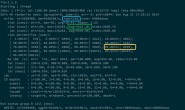C++生成标准的ASCII编码表
/*
The standard ASCII table defines 128 character codes (from 0 to 127), of
which, the first 32 are control codes (non-printable), and the remaining 96
character codes are representable characters:
*/
#include <iostream>
#include <iomanip>
using namespace std;
int main()
{ int i,j;
char cmd[32][4]= {"NUL","SOH","STX","ETX","EOT","ENQ","ACK","BEL","BS","TAB",
"LF","VT","FF","CR","SO","SI","DLE","DC1","DC2","DC3","DC4","NAK",
"SYN","ETB","CAN","EM","SUB","ESC","FS","GS","RS","US"};
cout << "The standard ASCII table defines 128 character codes (from 0 to 127),";
cout << "\n of which,the first 32 are control codes (non-printable), and the";
cout << "\n remaining 96 charactercodes are representable characters:\n";
cout << "*";
for( i = 0 ; i < 10 ; i++)
cout << setw(4) << i;
for( i = 0x41 ; i < 0x47 ; i++)
cout << setw(4) << static_cast<char>(i);
cout << endl << "-- ";
for( i = 0 ; i < 16 ; i++)
cout << left << "--- ";
for( i = 0 ; i < 2 ; i++ )
{
cout << endl << i << "| " ;
for(j = 0 ; j < 16 ; j++)
cout << setw(4) << left << cmd[i*16+j];
}
for( i = 2 ; i < 8 ; i++ )
{
cout << endl << i << "| " ;
for( j = 0 ; j < 16 ; j++)
if((i*16 + j) != 127 )
cout << setw(4) << left << static_cast<char>(i*16+j);
}
cout << endl << endl;
return 0;
}
/*Program's output
The standard ASCII table defines 128 character codes (from 0 to 127),
of which,the first 32 are control codes (non-printable), and the
remaining 96 charactercodes are representable characters:
* 0 1 2 3 4 5 6 7 8 9 A B C D E F
-- --- --- --- --- --- --- --- --- --- --- --- --- --- --- --- ---
0| NUL SOH STX ETX EOT ENQ ACK BEL BS TAB LF VT FF CR SO SI
1| DLE DC1 DC2 DC3 DC4 NAK SYN ETB CAN EM SUB ESC FS GS RS US
2| ! " # $ % & ' ( ) * + , - . /
3| 0 1 2 3 4 5 6 7 8 9 : ; < = > ?
4| @ A B C D E F G H I J K L M N O
5| P Q R S T U V W X Y Z [ \ ] ^ _
6| ` a b c d e f g h i j k l m n o
7| p q r s t u v w x y z { | } ~
Process returned 0 (0x0) execution time : 0.078 s
Press any key to continue.
*/




